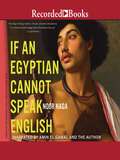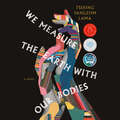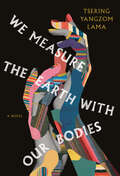Service Alert
CD service concludes July 31, 2025
CELA's audiobooks and magazines are available in Direct to Player and downloadable formats. We no longer mail out CDs. Please contact us for more information.
CELA's audiobooks and magazines are available in Direct to Player and downloadable formats. We no longer mail out CDs. Please contact us for more information.
Showing 1 - 6 of 6 items

By Brian Thomas Isaac. 2021
It's 1956, and six-year-old Eddie Toma lives with his mother, Grace, and his little brother, Lewis, near the Salmon River…
on the far edge of the Okanagan Indian Reserve in the British Columbia Southern Interior. Grace, her friend Isabel, Isabel's husband Ray, and his nephew Gregory cross the border to work as summer farm labourers in Washington state. There Eddie is free to spend long days with Gregory exploring the farm: climbing a hill to watch the sunset and listening to the wind in the grass. The boys learn from Ray's funny and dark stories. But when tragedy strikes, Eddie returns home grief-stricken, confused, and lonely. Eddie's life is governed by the decisions of the adults around him. Grace is determined to have him learn the ways of the white world by sending him to school in the small community of Falkland. On Eddie's first day of school, as he crosses the reserve boundary at the Salmon River bridge, he leaves behind his world. Grace challenges the Indian Agent and writes futile letters to Ottawa to protest the sparse resources in their community. His father returns to the family after years away only to bring chaos and instability. Isabel and Ray join them in an overcrowded house. Only in his grandmother's company does he find solace and true companionship. In his teens, Eddie's future seems more secure—he finds a job, and his long-time crush on his white neighbour Eva is finally reciprocated. But every time things look up, circumstances beyond his control crash down around him. The cumulative effects of guilt, grief, and despair threaten everything Eddie has ever known or loved. All the Quiet Places is the story of what can happen when every adult in a person's life has been affected by colonialism; it tells of the acute separation from culture that can occur even at home in a loved familiar landscape. Its narrative power relies on the unguarded, unsentimental witness provided by Eddie
By Noor Naga. 2022
Winner of the Graywolf Press African Fiction Prize, a lush experimental novel about love as a weapon of empire. In…
the aftermath of the Arab Spring, an Egyptian American woman and a man from the village of Shobrakheit meet at a café in Cairo. He was a photographer of the revolution, but now finds himself unemployed and addicted to cocaine, living in a rooftop shack. She is a nostalgic daughter of immigrants "returning" to a country she's never been to before, teaching English and living in a light-filled flat with balconies on all sides. They fall in love and he moves in. But soon their desire?for one another, for the selves they want to become through the other?takes a violent turn that neither of them expected. A dark romance exposing the gaps in American identity politics, especially when exported overseas, If an Egyptian Cannot Speak English is at once ravishing and wry, scathing and tender. Told in alternating perspectives, Noor Naga's experimental debut examines the ethics of fetishizing the homeland and punishing the beloved . . . and vice versa. In our globalized twenty-first-century world, what are the new faces (and races) of empire? When the revolution fails, how long can someone survive the disappointment? Who suffers and, more crucially, who gets to tell about it?
By Brian Thomas Isaac. 2021
Longlisted for CBC Canada ReadsAn Indigo Top 100 Book of 2021An Indigo Top 10 Best Canadian Fiction Book of 2021"What…
a welcome debut. Young Eddie Toma's passage through the truly ugly parts of this world is met, like an antidote, or perhaps a compensation, by his remarkable awareness of its beauty. This is a writer who understands youth, and how to tell a story." —Gil Adamson, winner of the Writers' Trust Fiction Prize for RidgerunnerBrian Isaac's powerful debut novel All the Quiet Places is the coming-of-age story of Eddie Toma, an Indigenous (Syilx) boy, told through the young narrator's wide-eyed observations of the world around him.It's 1956, and six-year-old Eddie Toma lives with his mother, Grace, and his little brother, Lewis, near the Salmon River on the far edge of the Okanagan Indian Reserve in the British Columbia Southern Interior. Grace, her friend Isabel, Isabel's husband Ray, and his nephew Gregory cross the border to work as summer farm labourers in Washington state. There Eddie is free to spend long days with Gregory exploring the farm: climbing a hill to watch the sunset and listening to the wind in the grass. The boys learn from Ray's funny and dark stories. But when tragedy strikes, Eddie returns home grief-stricken, confused, and lonely.Eddie's life is governed by the decisions of the adults around him. Grace is determined to have him learn the ways of the white world by sending him to school in the small community of Falkland. On Eddie"s first day of school, as he crosses the reserve boundary at the Salmon River bridge, he leaves behind his world. Grace challenges the Indian Agent and writes futile letters to Ottawa to protest the sparse resources in their community. His father returns to the family after years away only to bring chaos and instability. Isabel and Ray join them in an overcrowded house. Only in his grandmother's company does he find solace and true companionship.In his teens, Eddie's future seems more secure—he finds a job, and his long-time crush on his white neighbour Eva is finally reciprocated. But every time things look up, circumstances beyond his control crash down around him. The cumulative effects of guilt, grief, and despair threaten everything Eddie has ever known or loved.All the Quiet Places is the story of what can happen when every adult in a person's life has been affected by colonialism; it tells of the acute separation from culture that can occur even at home in a loved familiar landscape. Its narrative power relies on the unguarded, unsentimental witness provided by Eddie.
By Tsering Yangzom Lama. 2022
A haunting first novel that recounts a Tibetan family’s fifty-year journey through exile and their struggles to forge new lives…
of dignity, love, and hope. A New York Times Book Review Summer Read Pick A Washington Post Noteworthy Book of the Month. In the wake of China’s invasion of Tibet throughout the 1950s, Lhamo and her sister, Tenkyi, arrive at a refugee camp on the border of Nepal, having survived the dangerous journey across the Himalayas into exile when so many others did not. As Lhamo—haunted by the loss of her homeland and her mother, the village oracle—tries to rebuild a life amid a shattered community, hope arrives in the form of a young man named Samphel and his uncle, who brings with him the ancient statue of the Nameless Saint, a relic long rumoured to vanish and reappear in times of need. Decades later, the sisters are separated, and Tenkyi is living with Lhamo’s daughter, Dolma, in Toronto's Parkdale neighbourhood. While Tenkyi works as a cleaner and struggles with traumatic memories, Dolma vies for a place as a scholar of Tibetan Studies. But when Dolma comes across the Nameless Saint in a collector’s vault, she must decide what she is willing to do for her community, even if it means risking her dreams. Breathtaking in scope and powerfully intimate, We Measure the Earth with Our Bodies is a gorgeously written meditation on colonization, displacement, and the lengths we'll go to remain connected to our families and ancestral lands. Told through the lives of four people over fifty years, this beautifully lyrical debut novel provides a nuanced portrait of the world of Tibetan exiles.
By Tsering Yangzom Lama. 2022
A haunting first novel that recounts a Tibetan family’s fifty-year journey through exile and their struggles to forge new lives…
of dignity, love, and hope.A New York Times Book Review Summer Read PickA Washington Post Noteworthy Book of the MonthOne of Booklist's Top 10 Historical Fiction DebutsOne of Publishers Weekly's Writers to WatchA Most Anticipated Book - The Millions * Ms. Magazine * BustleLonglisted for the Center for Fiction First Novel Prize and the Toronto Book Awards.In the wake of China’s invasion of Tibet throughout the 1950s, Lhamo and her sister, Tenkyi, arrive at a refugee camp on the border of Nepal, having survived the dangerous journey across the Himalayas into exile when so many others did not. As Lhamo—haunted by the loss of her homeland and her mother, the village oracle—tries to rebuild a life amid a shattered community, hope arrives in the form of a young man named Samphel and his uncle, who brings with him the ancient statue of the Nameless Saint, a relic long rumoured to vanish and reappear in times of need. Decades later, the sisters are separated, and Tenkyi is living with Lhamo’s daughter, Dolma, in Toronto's Parkdale neighbourhood. While Tenkyi works as a cleaner and struggles with traumatic memories, Dolma vies for a place as a scholar of Tibetan Studies. But when Dolma comes across the Nameless Saint in a collector’s vault, she must decide what she is willing to do for her community, even if it means risking her dreams. Breathtaking in scope and powerfully intimate, We Measure the Earth with Our Bodies is a gorgeously written meditation on colonization, displacement, and the lengths we'll go to remain connected to our families and ancestral lands. Told through the lives of four people over fifty years, this beautifully lyrical debut novel provides a nuanced portrait of the world of Tibetan exiles.
By Tsering Yangzom Lama. 2022
A haunting first novel that recounts a Tibetan family&’s fifty-year journey through exile and their struggles to forge new lives…
of dignity, love, and hope. Named one of Publishers Weekly's Writers to Watch, a "most anticipated book of the year" by The Millions, Ms., and a "noteworthy book of the month by the Washington Post and Bustle.In the wake of China&’s invasion of Tibet throughout the 1950s, Lhamo and her sister, Tenkyi, arrive at a refugee camp on the border of Nepal, having survived the dangerous journey across the Himalayas into exile when so many others did not. As Lhamo—haunted by the loss of her homeland and her mother, the village oracle—tries to rebuild a life amid a shattered community, hope arrives in the form of a young man named Samphel and his uncle, who brings with him the ancient statue of the Nameless Saint, a relic long rumoured to vanish and reappear in times of need. Decades later, the sisters are separated, and Tenkyi is living with Lhamo&’s daughter, Dolma, in Toronto's Parkdale neighbourhood. While Tenkyi works as a cleaner and struggles with traumatic memories, Dolma vies for a place as a scholar of Tibetan Studies. But when Dolma comes across the Nameless Saint in a collector&’s vault, she must decide what she is willing to do for her community, even if it means risking her dreams. Breathtaking in scope and powerfully intimate, We Measure the Earth with Our Bodies is a gorgeously written meditation on colonization, displacement, and the lengths we'll go to remain connected to our families and ancestral lands. Told through the lives of four people over fifty years, this beautifully lyrical debut novel provides a nuanced portrait of the world of Tibetan exiles.